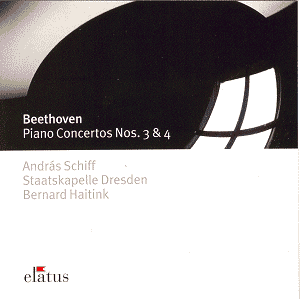These
are at the opposite pole from the sometimes wilful performances
I heard from Aimard
and Harnoncourt recently. In the first pages of the 3rd
Concerto one is struck by the precision with which dynamics are
observed; accents are exactly where they are written, fortissimos
come where Beethoven put them and are definitely more than single
fortes. And all this is brought off with a most musical
sound; accents make their point without any jabbing. Above all,
though, one is struck by the evenness of pulse which allows the
music to proceed inevitably, seemingly of its own accord. If Harnoncourt/Aimard
harked back to the pre-Schnabel days when each musical idea went
at its own tempo, Haitink has no truck with that.
Given
such a majestic framework Schiff need hardly do more than slot
himself in, and really his clean, well-prepared but not especially
tonally beautiful playing amounts to no more than that. It works
because it is such an integrated conception – the cadenza follows
so evenly from the preceding tutti that one wonders if the Maestro
is conducting it – although in matters of detail Schiff is less
precise than Haitink. Accents and dynamics come more or less
but not exactly where Beethoven put them. This is common
enough and would pass unnoticed with a less precise accompaniment.
In
the Largo it is Schiff who starts things off, and it is not quite
certain what his tempo is, but why worry, Mr. Haitink will sort
that out when he comes in, and he does. The finale is played in
a similar manner to the first movement, but perhaps it should
not be and I found it a little joyless. Still, this is a performance
of great integrity with an especially fine first movement.
The
same virtues are not enough for the 4th Concerto. One
does not necessarily wish it to be treated as Scriabin or Delius,
as Aimard/Harnoncourt did, but at least they found the magic in
it. The plainness with which Haitink treats the prevailing four-note
motive in the first movement becomes irritating in the long run,
and the lack of tonal beauty on the part of the soloist (at least
as recorded) is more serious in this work. At the end I reminded
myself of Curzon’s magical touch here, undimmed by the elderly
recording. In the slow movement, when the orchestra begins to
play piano, they do it with schoolmasterly correctness rather
than as if calmed and transfixed by the beauty of the piano playing.
Schiff’s enunciation of the Rondo theme is lumpy – hear Curzon’s
natural spontaneity at this point.
I
must say my expectations of this were much higher. As it is I
can only recommend it if you have a fine 4th already
but need a good 3rd.
Christopher
Howell
